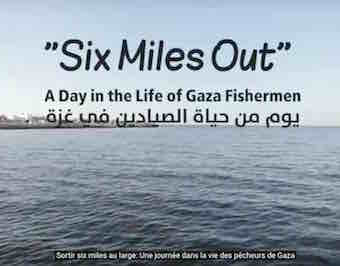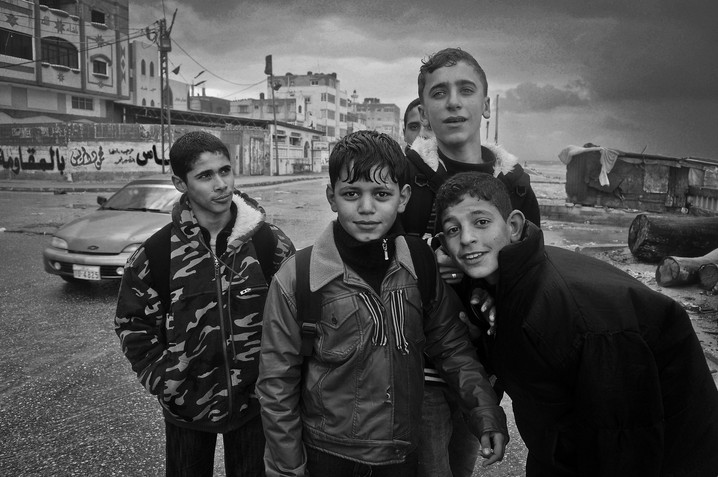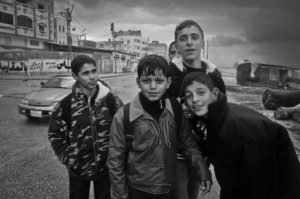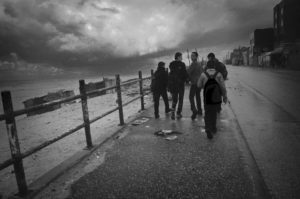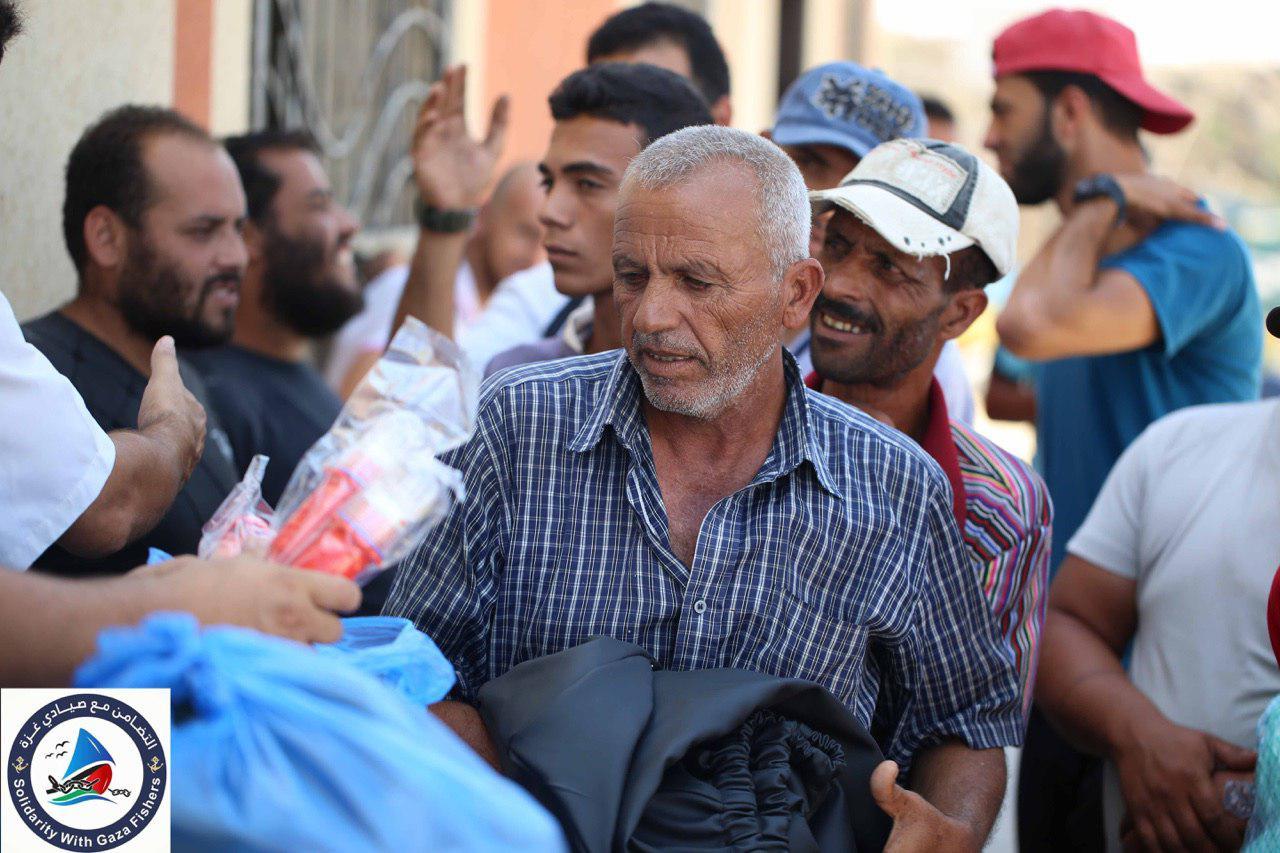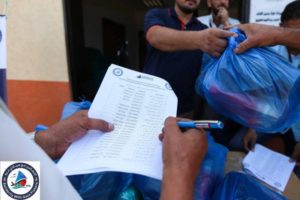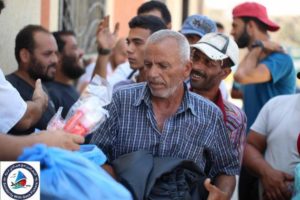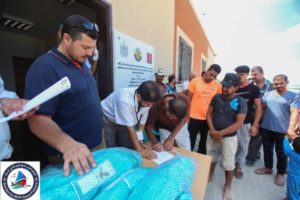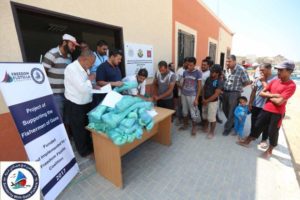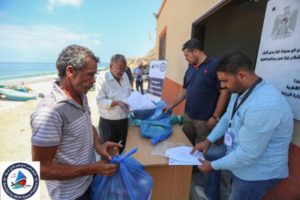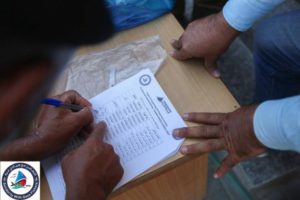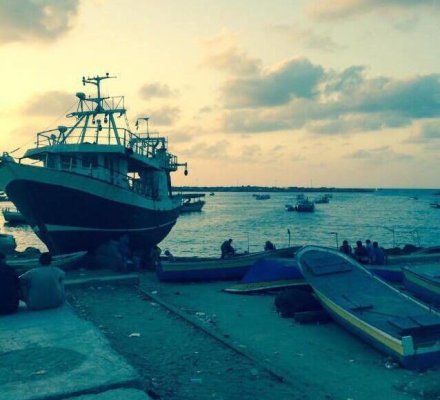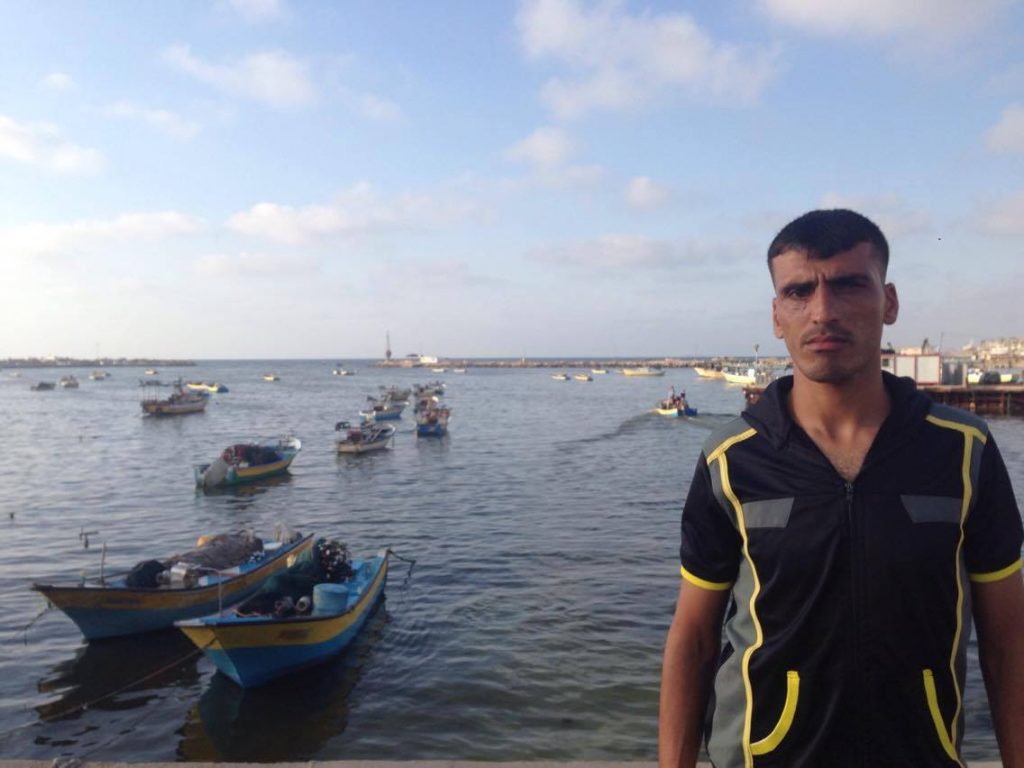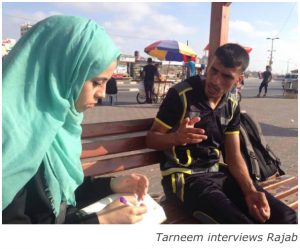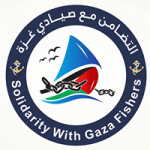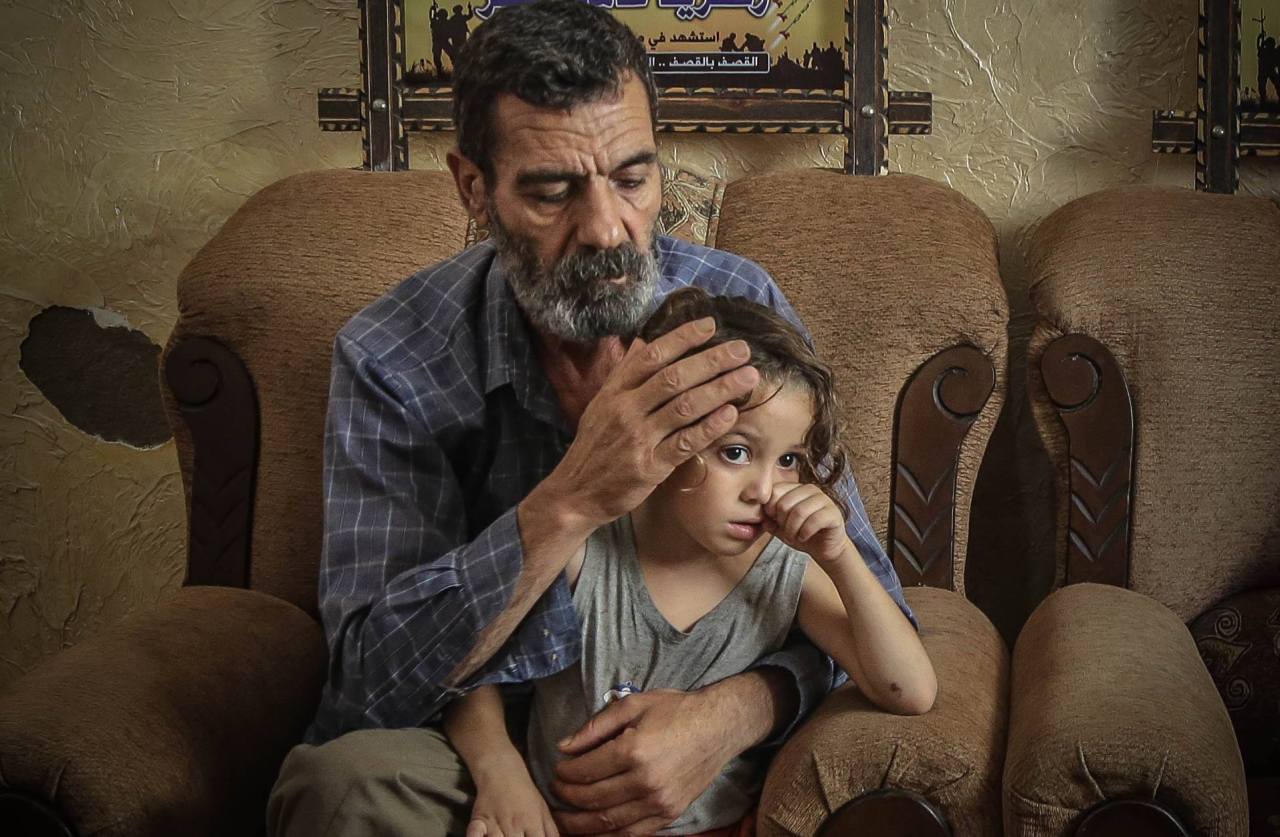
By Leen Abu Said, in Gaza. This article is from our partners at We Are Not Numbers.
 Solidarity with Gaza fishers is proud to introduce an ongoing series featuring the work of these young Palestinian journalists.Majed Bakr and his granddaughter [photo by Ezz Al Zanoon]
Solidarity with Gaza fishers is proud to introduce an ongoing series featuring the work of these young Palestinian journalists.Majed Bakr and his granddaughter [photo by Ezz Al Zanoon]
On May 15, 2017, Israeli naval forces shot dead a young fisherman from Gaza while he was in his boat. Below is an interview with Majed Bakr, the father of the victim—also a fisherman from Gaza and a member of the family of the four little Bakr boys killed by an Israeli missile while playing on the beach in 2014.
Could you introduce yourself to my readers?
Majed: My name is Majed Bakr. My four sons and I have suffered due to Israel’s [restrictions on our livelihood] since 2012 [when the first of the attacks on our boat occurred] until the 15th of May of this year. As our ability to fish becomes more complicated, each day becomes another day of suffering for us. [Note: For so-called “security” reasons, the Israeli military prohibits boats from Gaza from sailing out more than three to 9 nautical miles, depending on their whim. However, the best fish are found 11 or more miles out.]
What happened on the 15th of May?
Majed: As usual, my sons Omran, Fadi, Saddam and Mohammed sailed out to sea to fish. This is how we make a living. They were 400 meters away from the Israeli-imposed nine-nautical-mile limit. Suddenly, an Israeli patrol boat started shooting live bullets at their boat. One of them hit my son, Mohammed, in his heart. Obviously, the others who were with him are not doctors and couldn’t save his life. They shouted to get urgent help. He was already vomiting blood and his heart had swelled like a balloon by the time the Israeli navy came to take him to a hospital in Majdal, a city in occupied Palestine.
If they wanted to save him, then why did they shoot at him in the first place?
Majed: This is their policy: to ruin with the right hand, then to fix with the left. Therefore, their position looks as if it’s legal and humanitarian internationally. (Majed heaves a deep sigh.) And he died.
I’m sorry.
(Long silence.)
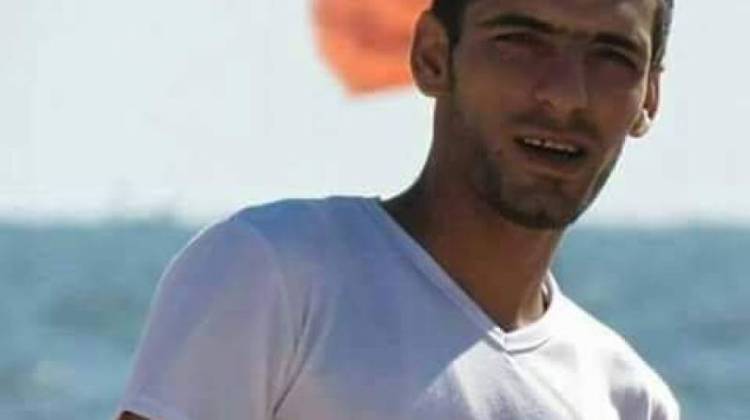 Mohammed Bakr
Mohammed Bakr
How old was he?
Majed: He was born on the 19th of February in 1992, and he died on the 15th of May. He was 25 years old. He has two daughters: Joud, 3 years old, and Majeda 10 months. On the day of the funeral, Joud saw his father’s dead body and said, “Dad is asleep. He went to the sea. He is not back yet.”
Do you still sail now?
Majed: I sail every day with my sons. I am a 57-year-old man and this is my life. But then one day, I said to Omran, “Son, you all are young men now. You can depend on yourselves.” Four days later, they went fishing without me and the accident happened. The Israeli navy boat was so fast; it was as if my sons’ boat was not moving. My son told me how Mohammed hugged the motor of the boat so the Israelis would stop shooting, but to no avail. We had taken out the boat as a loan in Mohammed’s name from the FATEN (Palestinian Credit and Development) Association, planning to buy it. But it was shot with seven bullets, and Mohammed died. I wish the boat was gone instead!
Why did they shoot him? Did he exceed the sailing limit?
Majed: A fisherman never intends to exceed the limit, but it happens very easily. The sea is naturally unstable. While a fisherman sails, the current pulls the boat as much as 300 meters in any direction. When we see an Israeli boat, we try to escape quickly. But the Israeli boats are free to shoot at us; sometimes they do, other times they leave us alone. This time, I was not with my sons, but the other times—since 2012—I was.
What else happened during that time?
Majed: Israel has destroyed five of my boats, in 2012, 2013, 2014, 2016 and, now, the fifth one this year. We paid only two months of the loan on the boat. We do not know how we can afford the rest now. It is a loan tied to Mohammed’s soul. (Note: In Islam, the soul is tied by any debts it has in life. When the dead person’s siblings pay his debt, his soul is liberated and becomes free from punishment.)
What does each boat cost?
Majed: It costs at least $10,000. We repaired one of the boats, which was brought back destroyed. That cost us 8,000 NIS [about $2,200].
Does fishing deserve all this sacrifice?
Majed: I adore the sea. Fishing is the profession of my ancestors. If I fish five hours a day, I earn just 30 NIS [$8]. But it’s better than working 12 hours a day as a construction worker and making the same amount. It is enough to live ok in Gaza. Here, even the employer whose daily salary is 400 NIS [$110] is in debt. Each son can never marry and have a family if they live in separate houses. So, with each one of them making 30 NIS, the total allows us to live in one house comfortably and to eat together. Only Allah blesses our days. But our lives are controlled by Israel’s mood.
Why does the fishing limit differ from one time to another?
Majed: The Israelis are not idiots. They know that the area in the sea where there are the most fish is found 11 miles or more from shore. We know this because we fished up to 14 miles before the siege on Gaza began. And not all of Gaza’s sea is open even up to 9 miles. They also prevent us from fishing in the entire sea during the reproduction season.
The fish usually stay in calm waters. So, we see the fish but we can’t fish. The Israeli navy officers say loudly in Hebrew, “The fish are ours, not yours.” But we never see any Israeli fishermen! Sometimes the Israeli navy uses water cannons to turn the boats of Gaza fishermen upside down, making the motors wet and obstructing the fishing process.
When will these attacks stop?
Majed: They will never stop. We are attacked daily. Since the beginning of the siege until now, I’ve lost six of my friends, and now my son. Mohammed is not the first martyr to the sea, nor will he be the last. Fishermen in Gaza have started losing hope. Some are selling their boats for one-third of their real cost. But we can’t stop fishing. We must go back to the sea to feed the family. To try to live is much better than to die without trying.
How is your family now?
Majed: We are all depressed. My wife wakes up crying and falls asleep crying. Mohammed’s wife can no longer live among us. I, as a man, look strong but my heart is broken. When I used to shout at Mohammed, as his father, his mother would stop me by saying, “When I gave birth to him, I lost my vision [fainted] for two hours.” And now, she loses her vision as she cries for him.
How will you live after this?
Majed: I don’t know exactly. Life is hard. One time, the wives of my sons gave me their wedding jewelry to sell so I could use the money to buy a new boat.
How do you feel now toward the sea?
Majed: I cannot look at it. I want to go to the Gaza port, but when I arrive, I turn around and go back home right away.
I have one last wish: I wish that no one has to bury his son or daughter while he is alive. No one, neither a friend nor an enemy.


